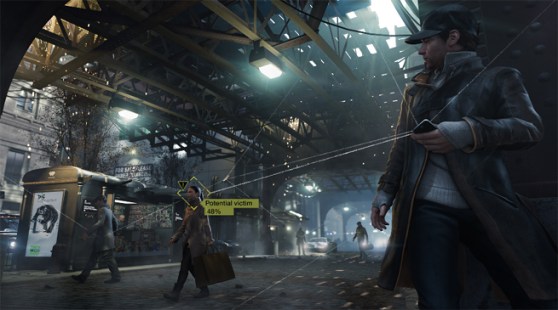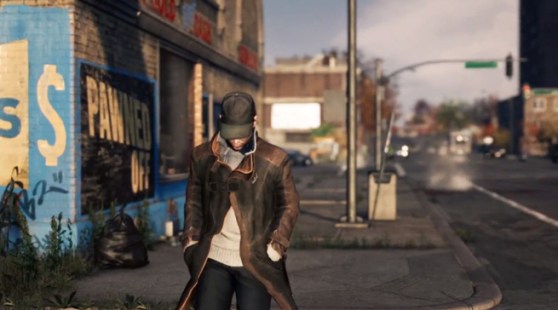Reads to school children. Failed CPR training. Father is currently in jail. Churchgoer. Makes porn films. Related to Dutch royalty. In possession of stolen credit cards. Potential victim. These slivers of data hang by every pedestrian you see walking down the street in Chicago.
Information is power, and career cybercriminal Aiden Pearce can access that information at will. Watch Dogs (releasing Nov. 19 on PC and all available consoles) then makes you decide what to do with it, diving deeper into strangers’ lives or quietly moving on. As Pearce, you constantly intersect with people on the street, mine their information with your smartphone’s Profiler, and make decisions based on what you learn about them.
In a fairly unusual move, Ubisoft showed us a 30-minute, hands-off demo that steered clear of any story or side missions in favor of various “random” encounters in Watch Dog’s open-world sandbox. After trading notes with people who attended other sessions, it’s clear that key moments repeated almost exactly across the different presentations, suggesting many in-game events were, to some extent, canned. On the other hand, I also saw a hatchback mow down Pearce just as he stepped out of his car.
I’m guessing that was unscripted.
Regardless, the game that took shape showed me a different kind of free-roaming playground with a different set of rules. Call it open-world morality.
“You start spying on people, looking into their lives, it becomes addictive,” says lead story designer Kevin Shortt. “You start seeing things you didn’t expect. It becomes hard to look away. Almost by accident, Pearce becomes a vigilante hero.”
Abusing the system
That’s when Pearce slips on his mask and goes to work.
The unusually symbol that mask bears comes with its own backstory; it started as part of the placeholder logo for Watch Dogs’ project codename, Nexus. “This was the symbol for connectivity,” says senior producer Dominic Guay, “but we added a little gap in the middle to represent themes of vulnerabilities, flaws, and hacking the connectivity.”
But before you can hack the world, Pearce has to slip a back door into a well-guarded City Operating System (ctOS) control center. It’s a lot like conquering the towers in Ubisoft’s other games — Far Cry 3 or Assassin’s Creed: Brotherhood, say — only with more options for breaching security. Pearce mixed it up a little, luring guards in by remote-hacking forklifts and then beating them down with his telescoping blackjack. Watch Dogs features a crafting system to build IEDs and decoys, but for the purposes of this demonstration, Pearce fell back on his assault rifle and a wad of dynamite to finish off the opposition. A hacked CCTV camera, rewound to the moment of detonation, confirms those kills.
After that, accessing the ctOS hub is a breeze, and the grid opens up. Pearce can now hack the “smart city” systems on every corner and pull info on everyone around him; age, occupation, income, and a tiny, 3-6-word story that gives them some personality.
That makes all the difference. Now you know a little something about them. They aren’t just faceless units wandering around in a Grand Theft Auto metropolis or an ancient Assassin’s Creed city. And if Mr. “Filed adoption papers” stored his bank information on his cellphone, you can siphon off his life savings to help bankroll Pearce’s personal mission of vengeance. But c’mon … the guy’s trying to do a noble thing. Should you steal from him?
That’s not a question I ever asked while pickpocketing scores of people as an assassin in ancient Rome. The man who solicits prostitutes, on the other hand, sounds like fair game.
Anti-heroics
You won’t find any shortage of ways to use information and the network against people, either. Tapping into free Wi-Fi hubs lets you spy on people inside their homes through their laptop webcams, tablets … anything that’s connected. I found one guy whispering sweet nothings into a dressed-up mannequin’s ear. Perfect blackmail material. I could’ve rifled through his email for more dirt, too. “Threaten” is always an option while negotiating prices at the local Pawned Off store. Pearce can also hack ATMs for quick money, or replace musical selections on public speakers with his own (purchased in-game, iPhone-style). Goodbye, muzak. Hello, thrash metal.
But unlike a Grand Theft Auto or even Red Dead Redemption, Pearce can proactively choose to help people.




